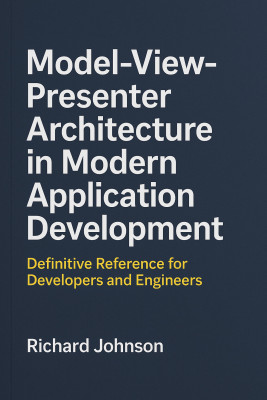Model-View-Presenter Architecture in Modern Application Development by Richard Johnson

Synopsis
"Model-View-Presenter Architecture in Modern Application Development"
Model-View-Presenter Architecture in Modern Application Development offers a comprehensive exploration of MVP—a cornerstone pattern for achieving a structured, maintainable, and scalable separation of concerns in user interface development. The book begins with a deep dive into the origins and theoretical underpinnings of MVP and its evolution from preceding UI architectures. Readers gain clarity on the distinct roles and responsibilities of Models, Views, and Presenters, along with an examination of MVP variants and how they compare to alternatives like MVC, MVVM, and VIPER. Guidance is provided to help architects and engineers determine where MVP excels, when it should be used, and the common pitfalls to avoid in diverse domains such as web, mobile, and desktop development.
Delving into advanced concepts, the book navigates critical engineering challenges such as decoupling strategies, interface-driven design, and lifecycle management—applying industry best practices anchored in SOLID principles. It addresses real-world complexities surrounding service integration, testability, modularization, and performance considerations, leveraging techniques for asynchronous communication, dependency injection, and robust error handling. Detailed chapters illuminate practical approaches to designing data-rich models, handling state and business logic, as well as techniques for building accessible, testable, and dynamic user interfaces across multiple platforms.
Rounding out the discussion, the book ventures into the dynamics of scaling MVP for large teams and distributed systems, integrating with cloud-native and microservices architectures, and supporting the latest multiplatform toolchains. Forward-looking sections cover MVP’s adaptation in emerging settings—from server-driven UIs and low-code platforms to AR, IoT, and edge computing—supplemented by critical surveys of modern frameworks, automation tools, and DevOps integration. With practical case studies, actionable best practices, and an eye on evolving research trends, this guide is indispensable for professionals committed to engineering resilient, future-proof software using the Model-View-Presenter paradigm.
Reviews
Write your review
Wanna review this e-book? Please Sign in to start your review.







